HND International Tourism: Sustainable Tourism Management Report
VerifiedAdded on 2023/01/12
|10
|2842
|25
Report
AI Summary
This report delves into the multifaceted aspects of sustainable and responsible tourism management. It begins by examining the adverse impacts of travel and tourism, setting the stage for the conceptual development of sustainable tourism. The report then outlines the key principles underpinning a sustainable tourism strategy, emphasizing resource management, waste reduction, and biodiversity maintenance. It further analyzes the roles of various stakeholders, including national and local governments, tourists, and tourism enterprises, in shaping the global sustainable tourism agenda. The report evaluates the ways in which these stakeholders contribute to strategic development, highlighting the implementation of tourism strategies, competitiveness, and safety measures. Finally, it compares and contrasts the outcomes of different sustainable tourism strategies, providing a comprehensive overview of the subject matter.
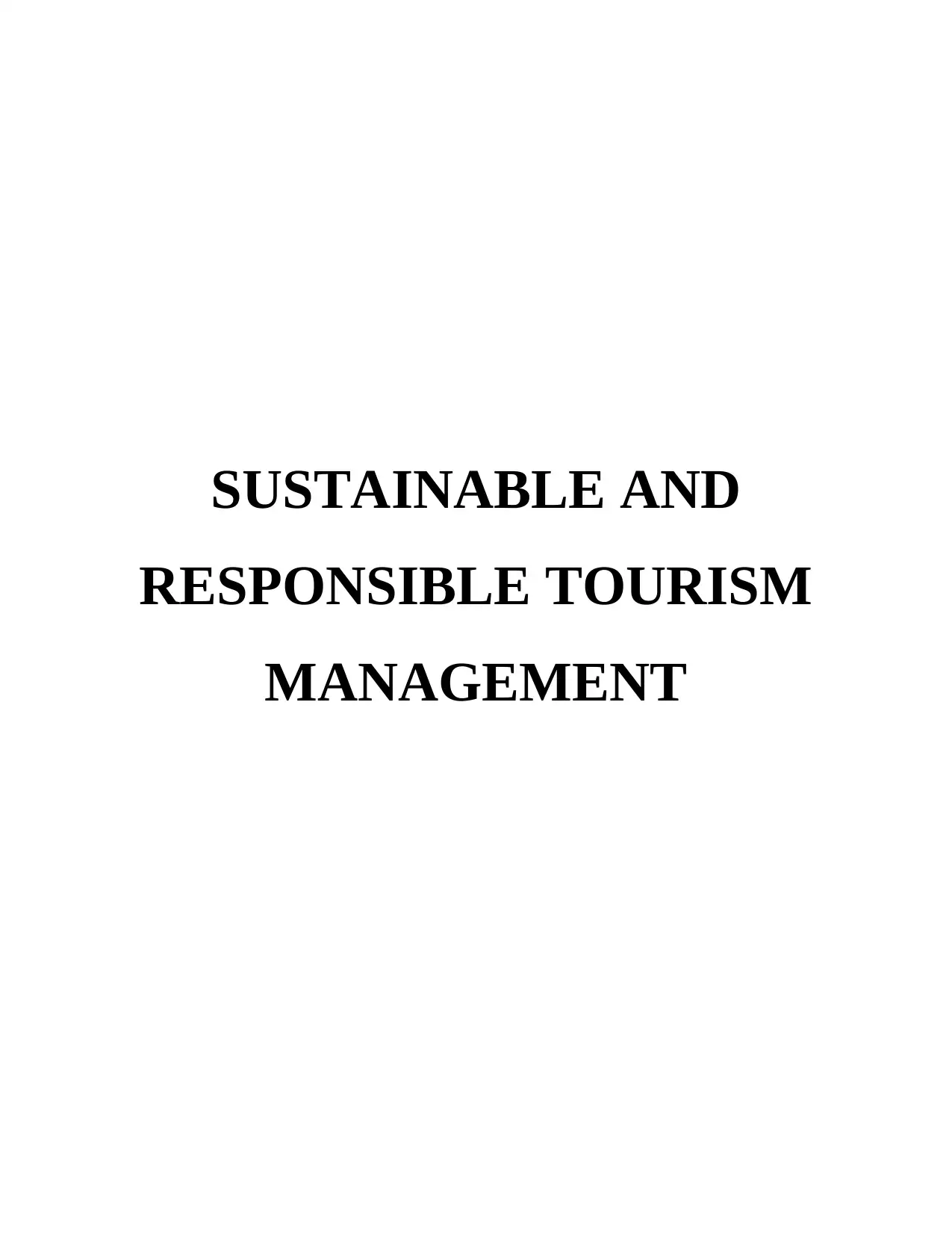
SUSTAINABLE AND
RESPONSIBLE TOURISM
MANAGEMENT
RESPONSIBLE TOURISM
MANAGEMENT
Paraphrase This Document
Need a fresh take? Get an instant paraphrase of this document with our AI Paraphraser
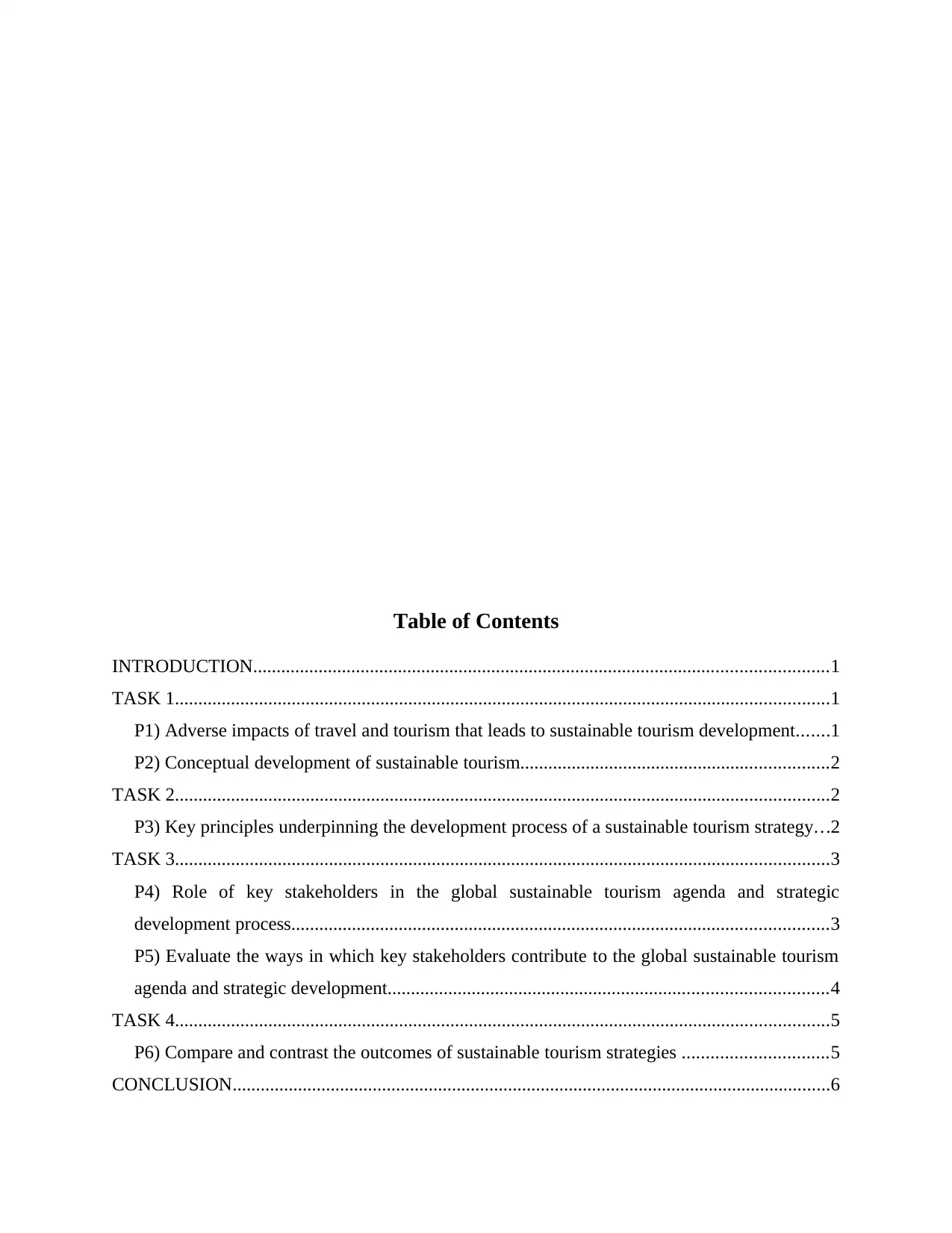
Table of Contents
INTRODUCTION...........................................................................................................................1
TASK 1............................................................................................................................................1
P1) Adverse impacts of travel and tourism that leads to sustainable tourism development.......1
P2) Conceptual development of sustainable tourism..................................................................2
TASK 2............................................................................................................................................2
P3) Key principles underpinning the development process of a sustainable tourism strategy...2
TASK 3............................................................................................................................................3
P4) Role of key stakeholders in the global sustainable tourism agenda and strategic
development process...................................................................................................................3
P5) Evaluate the ways in which key stakeholders contribute to the global sustainable tourism
agenda and strategic development..............................................................................................4
TASK 4............................................................................................................................................5
P6) Compare and contrast the outcomes of sustainable tourism strategies ...............................5
CONCLUSION................................................................................................................................6
INTRODUCTION...........................................................................................................................1
TASK 1............................................................................................................................................1
P1) Adverse impacts of travel and tourism that leads to sustainable tourism development.......1
P2) Conceptual development of sustainable tourism..................................................................2
TASK 2............................................................................................................................................2
P3) Key principles underpinning the development process of a sustainable tourism strategy...2
TASK 3............................................................................................................................................3
P4) Role of key stakeholders in the global sustainable tourism agenda and strategic
development process...................................................................................................................3
P5) Evaluate the ways in which key stakeholders contribute to the global sustainable tourism
agenda and strategic development..............................................................................................4
TASK 4............................................................................................................................................5
P6) Compare and contrast the outcomes of sustainable tourism strategies ...............................5
CONCLUSION................................................................................................................................6

REFRENCES...................................................................................................................................7
⊘ This is a preview!⊘
Do you want full access?
Subscribe today to unlock all pages.

Trusted by 1+ million students worldwide
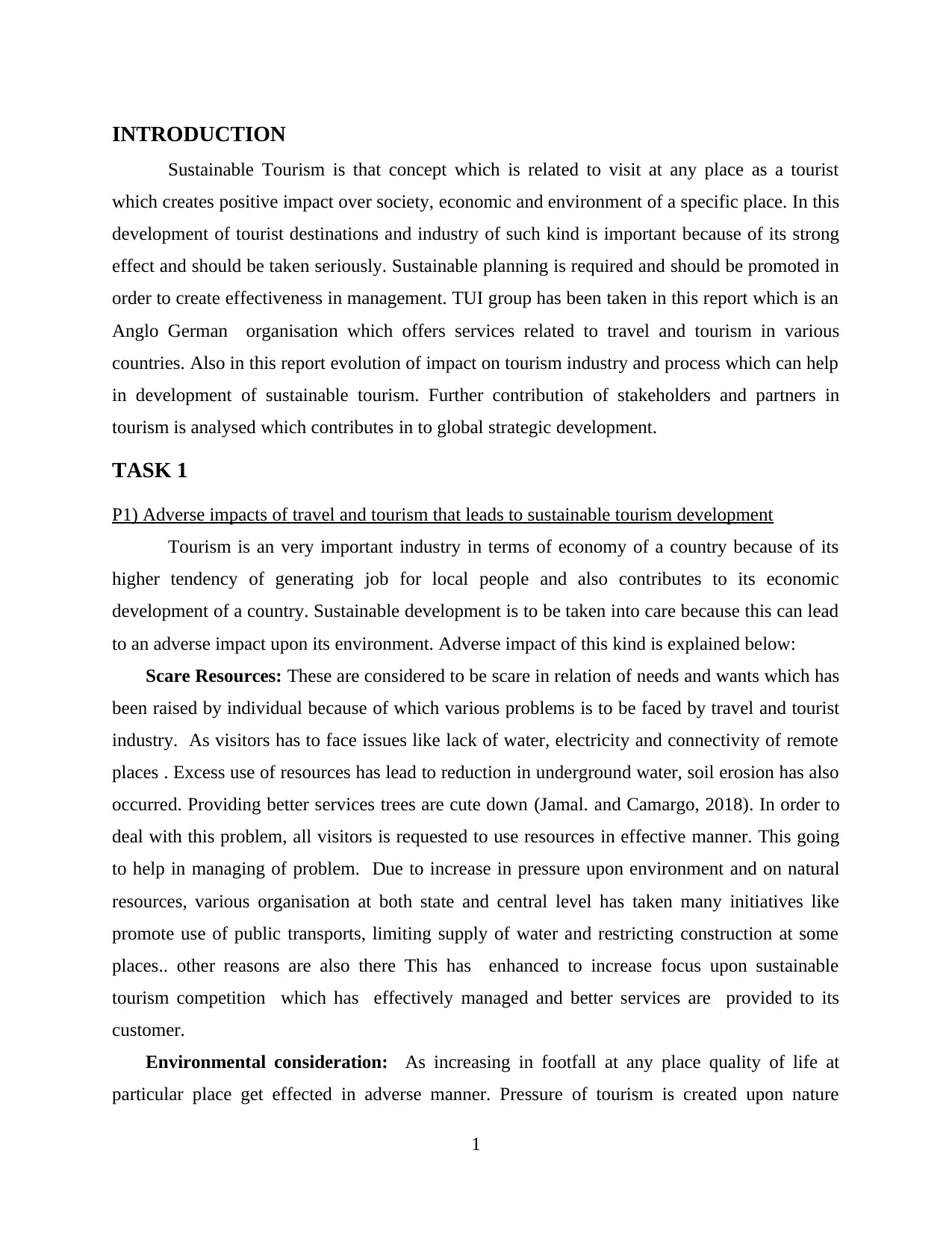
INTRODUCTION
Sustainable Tourism is that concept which is related to visit at any place as a tourist
which creates positive impact over society, economic and environment of a specific place. In this
development of tourist destinations and industry of such kind is important because of its strong
effect and should be taken seriously. Sustainable planning is required and should be promoted in
order to create effectiveness in management. TUI group has been taken in this report which is an
Anglo German organisation which offers services related to travel and tourism in various
countries. Also in this report evolution of impact on tourism industry and process which can help
in development of sustainable tourism. Further contribution of stakeholders and partners in
tourism is analysed which contributes in to global strategic development.
TASK 1
P1) Adverse impacts of travel and tourism that leads to sustainable tourism development
Tourism is an very important industry in terms of economy of a country because of its
higher tendency of generating job for local people and also contributes to its economic
development of a country. Sustainable development is to be taken into care because this can lead
to an adverse impact upon its environment. Adverse impact of this kind is explained below:
Scare Resources: These are considered to be scare in relation of needs and wants which has
been raised by individual because of which various problems is to be faced by travel and tourist
industry. As visitors has to face issues like lack of water, electricity and connectivity of remote
places . Excess use of resources has lead to reduction in underground water, soil erosion has also
occurred. Providing better services trees are cute down (Jamal. and Camargo, 2018). In order to
deal with this problem, all visitors is requested to use resources in effective manner. This going
to help in managing of problem. Due to increase in pressure upon environment and on natural
resources, various organisation at both state and central level has taken many initiatives like
promote use of public transports, limiting supply of water and restricting construction at some
places.. other reasons are also there This has enhanced to increase focus upon sustainable
tourism competition which has effectively managed and better services are provided to its
customer.
Environmental consideration: As increasing in footfall at any place quality of life at
particular place get effected in adverse manner. Pressure of tourism is created upon nature
1
Sustainable Tourism is that concept which is related to visit at any place as a tourist
which creates positive impact over society, economic and environment of a specific place. In this
development of tourist destinations and industry of such kind is important because of its strong
effect and should be taken seriously. Sustainable planning is required and should be promoted in
order to create effectiveness in management. TUI group has been taken in this report which is an
Anglo German organisation which offers services related to travel and tourism in various
countries. Also in this report evolution of impact on tourism industry and process which can help
in development of sustainable tourism. Further contribution of stakeholders and partners in
tourism is analysed which contributes in to global strategic development.
TASK 1
P1) Adverse impacts of travel and tourism that leads to sustainable tourism development
Tourism is an very important industry in terms of economy of a country because of its
higher tendency of generating job for local people and also contributes to its economic
development of a country. Sustainable development is to be taken into care because this can lead
to an adverse impact upon its environment. Adverse impact of this kind is explained below:
Scare Resources: These are considered to be scare in relation of needs and wants which has
been raised by individual because of which various problems is to be faced by travel and tourist
industry. As visitors has to face issues like lack of water, electricity and connectivity of remote
places . Excess use of resources has lead to reduction in underground water, soil erosion has also
occurred. Providing better services trees are cute down (Jamal. and Camargo, 2018). In order to
deal with this problem, all visitors is requested to use resources in effective manner. This going
to help in managing of problem. Due to increase in pressure upon environment and on natural
resources, various organisation at both state and central level has taken many initiatives like
promote use of public transports, limiting supply of water and restricting construction at some
places.. other reasons are also there This has enhanced to increase focus upon sustainable
tourism competition which has effectively managed and better services are provided to its
customer.
Environmental consideration: As increasing in footfall at any place quality of life at
particular place get effected in adverse manner. Pressure of tourism is created upon nature
1
Paraphrase This Document
Need a fresh take? Get an instant paraphrase of this document with our AI Paraphraser
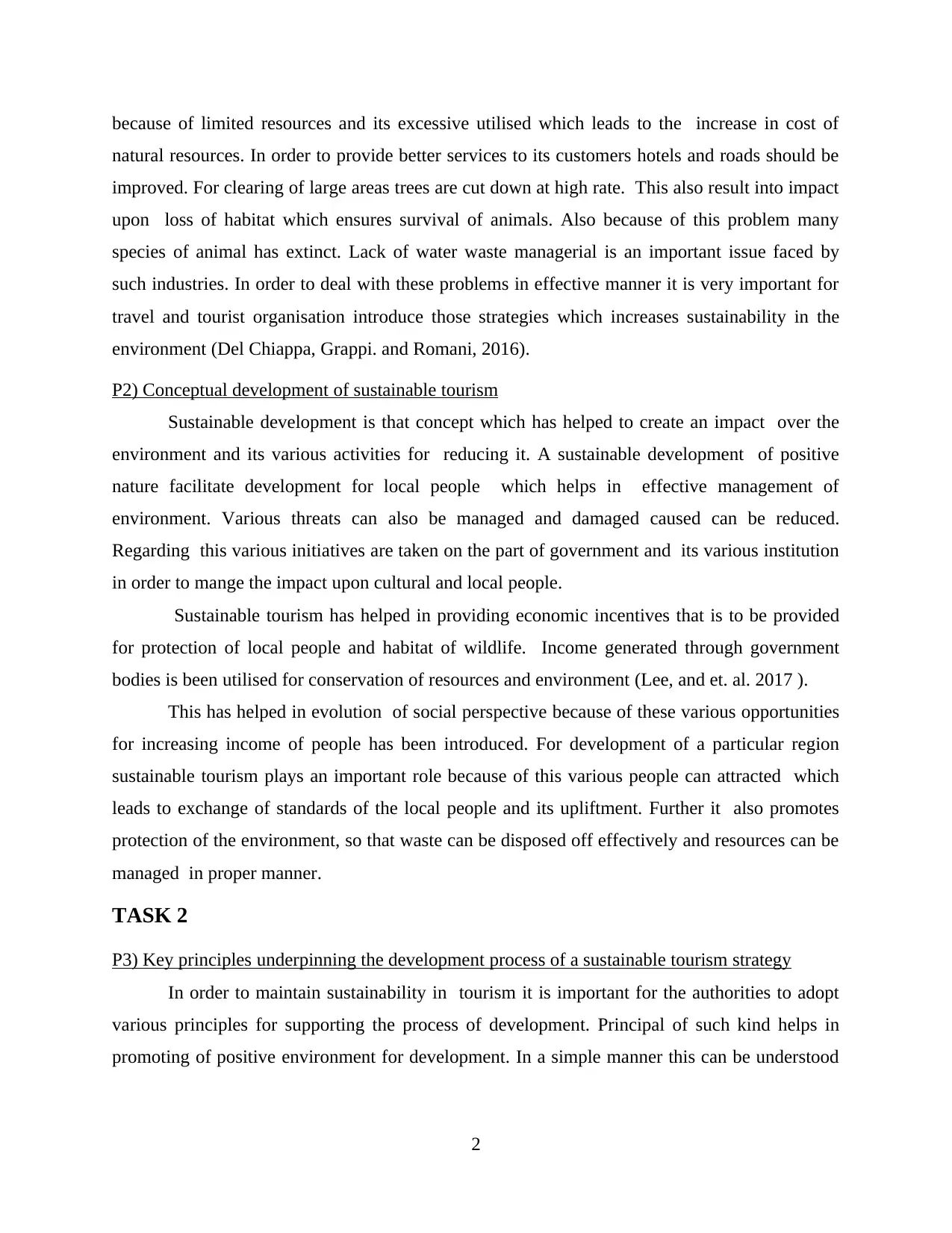
because of limited resources and its excessive utilised which leads to the increase in cost of
natural resources. In order to provide better services to its customers hotels and roads should be
improved. For clearing of large areas trees are cut down at high rate. This also result into impact
upon loss of habitat which ensures survival of animals. Also because of this problem many
species of animal has extinct. Lack of water waste managerial is an important issue faced by
such industries. In order to deal with these problems in effective manner it is very important for
travel and tourist organisation introduce those strategies which increases sustainability in the
environment (Del Chiappa, Grappi. and Romani, 2016).
P2) Conceptual development of sustainable tourism
Sustainable development is that concept which has helped to create an impact over the
environment and its various activities for reducing it. A sustainable development of positive
nature facilitate development for local people which helps in effective management of
environment. Various threats can also be managed and damaged caused can be reduced.
Regarding this various initiatives are taken on the part of government and its various institution
in order to mange the impact upon cultural and local people.
Sustainable tourism has helped in providing economic incentives that is to be provided
for protection of local people and habitat of wildlife. Income generated through government
bodies is been utilised for conservation of resources and environment (Lee, and et. al. 2017 ).
This has helped in evolution of social perspective because of these various opportunities
for increasing income of people has been introduced. For development of a particular region
sustainable tourism plays an important role because of this various people can attracted which
leads to exchange of standards of the local people and its upliftment. Further it also promotes
protection of the environment, so that waste can be disposed off effectively and resources can be
managed in proper manner.
TASK 2
P3) Key principles underpinning the development process of a sustainable tourism strategy
In order to maintain sustainability in tourism it is important for the authorities to adopt
various principles for supporting the process of development. Principal of such kind helps in
promoting of positive environment for development. In a simple manner this can be understood
2
natural resources. In order to provide better services to its customers hotels and roads should be
improved. For clearing of large areas trees are cut down at high rate. This also result into impact
upon loss of habitat which ensures survival of animals. Also because of this problem many
species of animal has extinct. Lack of water waste managerial is an important issue faced by
such industries. In order to deal with these problems in effective manner it is very important for
travel and tourist organisation introduce those strategies which increases sustainability in the
environment (Del Chiappa, Grappi. and Romani, 2016).
P2) Conceptual development of sustainable tourism
Sustainable development is that concept which has helped to create an impact over the
environment and its various activities for reducing it. A sustainable development of positive
nature facilitate development for local people which helps in effective management of
environment. Various threats can also be managed and damaged caused can be reduced.
Regarding this various initiatives are taken on the part of government and its various institution
in order to mange the impact upon cultural and local people.
Sustainable tourism has helped in providing economic incentives that is to be provided
for protection of local people and habitat of wildlife. Income generated through government
bodies is been utilised for conservation of resources and environment (Lee, and et. al. 2017 ).
This has helped in evolution of social perspective because of these various opportunities
for increasing income of people has been introduced. For development of a particular region
sustainable tourism plays an important role because of this various people can attracted which
leads to exchange of standards of the local people and its upliftment. Further it also promotes
protection of the environment, so that waste can be disposed off effectively and resources can be
managed in proper manner.
TASK 2
P3) Key principles underpinning the development process of a sustainable tourism strategy
In order to maintain sustainability in tourism it is important for the authorities to adopt
various principles for supporting the process of development. Principal of such kind helps in
promoting of positive environment for development. In a simple manner this can be understood
2
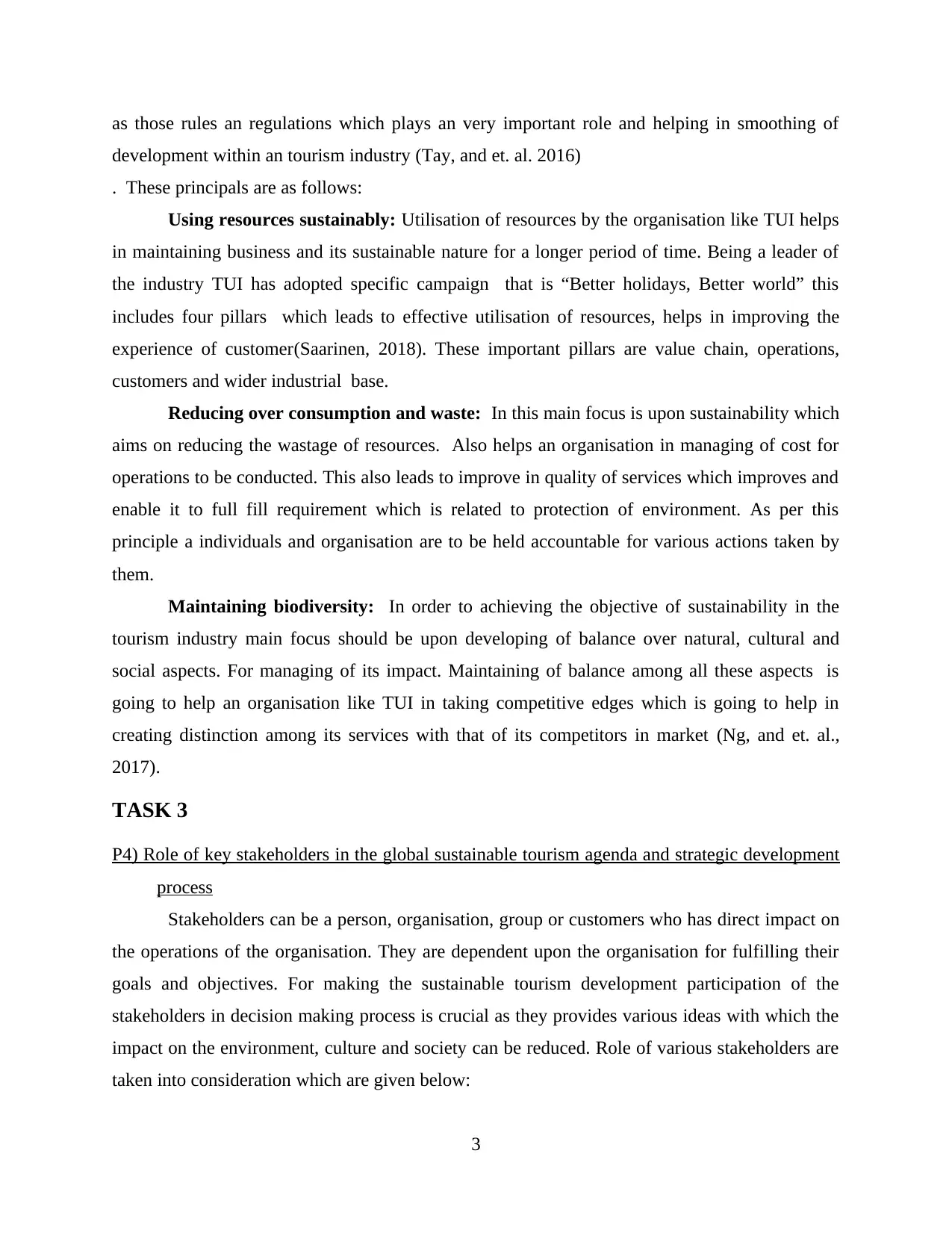
as those rules an regulations which plays an very important role and helping in smoothing of
development within an tourism industry (Tay, and et. al. 2016)
. These principals are as follows:
Using resources sustainably: Utilisation of resources by the organisation like TUI helps
in maintaining business and its sustainable nature for a longer period of time. Being a leader of
the industry TUI has adopted specific campaign that is “Better holidays, Better world” this
includes four pillars which leads to effective utilisation of resources, helps in improving the
experience of customer(Saarinen, 2018). These important pillars are value chain, operations,
customers and wider industrial base.
Reducing over consumption and waste: In this main focus is upon sustainability which
aims on reducing the wastage of resources. Also helps an organisation in managing of cost for
operations to be conducted. This also leads to improve in quality of services which improves and
enable it to full fill requirement which is related to protection of environment. As per this
principle a individuals and organisation are to be held accountable for various actions taken by
them.
Maintaining biodiversity: In order to achieving the objective of sustainability in the
tourism industry main focus should be upon developing of balance over natural, cultural and
social aspects. For managing of its impact. Maintaining of balance among all these aspects is
going to help an organisation like TUI in taking competitive edges which is going to help in
creating distinction among its services with that of its competitors in market (Ng, and et. al.,
2017).
TASK 3
P4) Role of key stakeholders in the global sustainable tourism agenda and strategic development
process
Stakeholders can be a person, organisation, group or customers who has direct impact on
the operations of the organisation. They are dependent upon the organisation for fulfilling their
goals and objectives. For making the sustainable tourism development participation of the
stakeholders in decision making process is crucial as they provides various ideas with which the
impact on the environment, culture and society can be reduced. Role of various stakeholders are
taken into consideration which are given below:
3
development within an tourism industry (Tay, and et. al. 2016)
. These principals are as follows:
Using resources sustainably: Utilisation of resources by the organisation like TUI helps
in maintaining business and its sustainable nature for a longer period of time. Being a leader of
the industry TUI has adopted specific campaign that is “Better holidays, Better world” this
includes four pillars which leads to effective utilisation of resources, helps in improving the
experience of customer(Saarinen, 2018). These important pillars are value chain, operations,
customers and wider industrial base.
Reducing over consumption and waste: In this main focus is upon sustainability which
aims on reducing the wastage of resources. Also helps an organisation in managing of cost for
operations to be conducted. This also leads to improve in quality of services which improves and
enable it to full fill requirement which is related to protection of environment. As per this
principle a individuals and organisation are to be held accountable for various actions taken by
them.
Maintaining biodiversity: In order to achieving the objective of sustainability in the
tourism industry main focus should be upon developing of balance over natural, cultural and
social aspects. For managing of its impact. Maintaining of balance among all these aspects is
going to help an organisation like TUI in taking competitive edges which is going to help in
creating distinction among its services with that of its competitors in market (Ng, and et. al.,
2017).
TASK 3
P4) Role of key stakeholders in the global sustainable tourism agenda and strategic development
process
Stakeholders can be a person, organisation, group or customers who has direct impact on
the operations of the organisation. They are dependent upon the organisation for fulfilling their
goals and objectives. For making the sustainable tourism development participation of the
stakeholders in decision making process is crucial as they provides various ideas with which the
impact on the environment, culture and society can be reduced. Role of various stakeholders are
taken into consideration which are given below:
3
⊘ This is a preview!⊘
Do you want full access?
Subscribe today to unlock all pages.

Trusted by 1+ million students worldwide
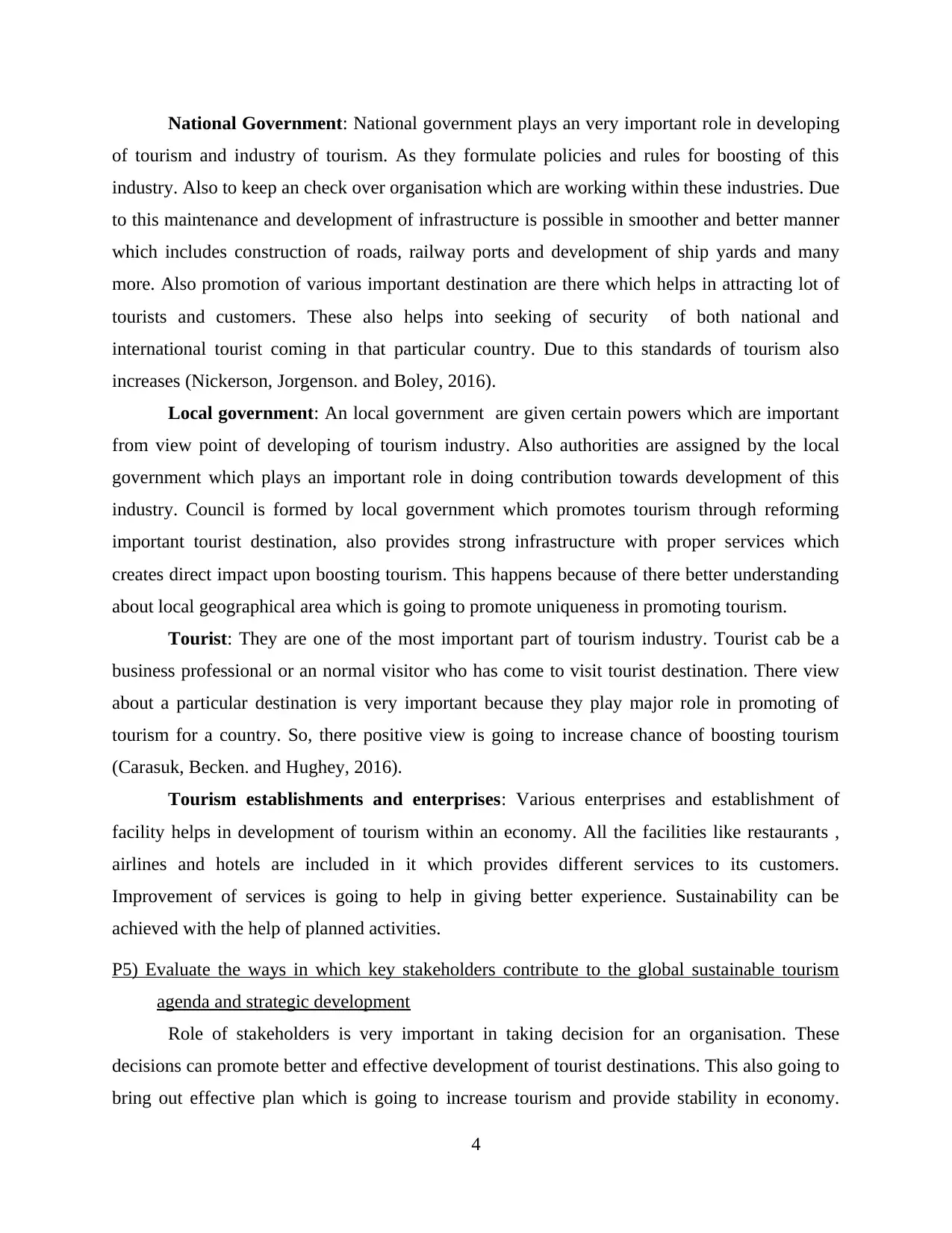
National Government: National government plays an very important role in developing
of tourism and industry of tourism. As they formulate policies and rules for boosting of this
industry. Also to keep an check over organisation which are working within these industries. Due
to this maintenance and development of infrastructure is possible in smoother and better manner
which includes construction of roads, railway ports and development of ship yards and many
more. Also promotion of various important destination are there which helps in attracting lot of
tourists and customers. These also helps into seeking of security of both national and
international tourist coming in that particular country. Due to this standards of tourism also
increases (Nickerson, Jorgenson. and Boley, 2016).
Local government: An local government are given certain powers which are important
from view point of developing of tourism industry. Also authorities are assigned by the local
government which plays an important role in doing contribution towards development of this
industry. Council is formed by local government which promotes tourism through reforming
important tourist destination, also provides strong infrastructure with proper services which
creates direct impact upon boosting tourism. This happens because of there better understanding
about local geographical area which is going to promote uniqueness in promoting tourism.
Tourist: They are one of the most important part of tourism industry. Tourist cab be a
business professional or an normal visitor who has come to visit tourist destination. There view
about a particular destination is very important because they play major role in promoting of
tourism for a country. So, there positive view is going to increase chance of boosting tourism
(Carasuk, Becken. and Hughey, 2016).
Tourism establishments and enterprises: Various enterprises and establishment of
facility helps in development of tourism within an economy. All the facilities like restaurants ,
airlines and hotels are included in it which provides different services to its customers.
Improvement of services is going to help in giving better experience. Sustainability can be
achieved with the help of planned activities.
P5) Evaluate the ways in which key stakeholders contribute to the global sustainable tourism
agenda and strategic development
Role of stakeholders is very important in taking decision for an organisation. These
decisions can promote better and effective development of tourist destinations. This also going to
bring out effective plan which is going to increase tourism and provide stability in economy.
4
of tourism and industry of tourism. As they formulate policies and rules for boosting of this
industry. Also to keep an check over organisation which are working within these industries. Due
to this maintenance and development of infrastructure is possible in smoother and better manner
which includes construction of roads, railway ports and development of ship yards and many
more. Also promotion of various important destination are there which helps in attracting lot of
tourists and customers. These also helps into seeking of security of both national and
international tourist coming in that particular country. Due to this standards of tourism also
increases (Nickerson, Jorgenson. and Boley, 2016).
Local government: An local government are given certain powers which are important
from view point of developing of tourism industry. Also authorities are assigned by the local
government which plays an important role in doing contribution towards development of this
industry. Council is formed by local government which promotes tourism through reforming
important tourist destination, also provides strong infrastructure with proper services which
creates direct impact upon boosting tourism. This happens because of there better understanding
about local geographical area which is going to promote uniqueness in promoting tourism.
Tourist: They are one of the most important part of tourism industry. Tourist cab be a
business professional or an normal visitor who has come to visit tourist destination. There view
about a particular destination is very important because they play major role in promoting of
tourism for a country. So, there positive view is going to increase chance of boosting tourism
(Carasuk, Becken. and Hughey, 2016).
Tourism establishments and enterprises: Various enterprises and establishment of
facility helps in development of tourism within an economy. All the facilities like restaurants ,
airlines and hotels are included in it which provides different services to its customers.
Improvement of services is going to help in giving better experience. Sustainability can be
achieved with the help of planned activities.
P5) Evaluate the ways in which key stakeholders contribute to the global sustainable tourism
agenda and strategic development
Role of stakeholders is very important in taking decision for an organisation. These
decisions can promote better and effective development of tourist destinations. This also going to
bring out effective plan which is going to increase tourism and provide stability in economy.
4
Paraphrase This Document
Need a fresh take? Get an instant paraphrase of this document with our AI Paraphraser
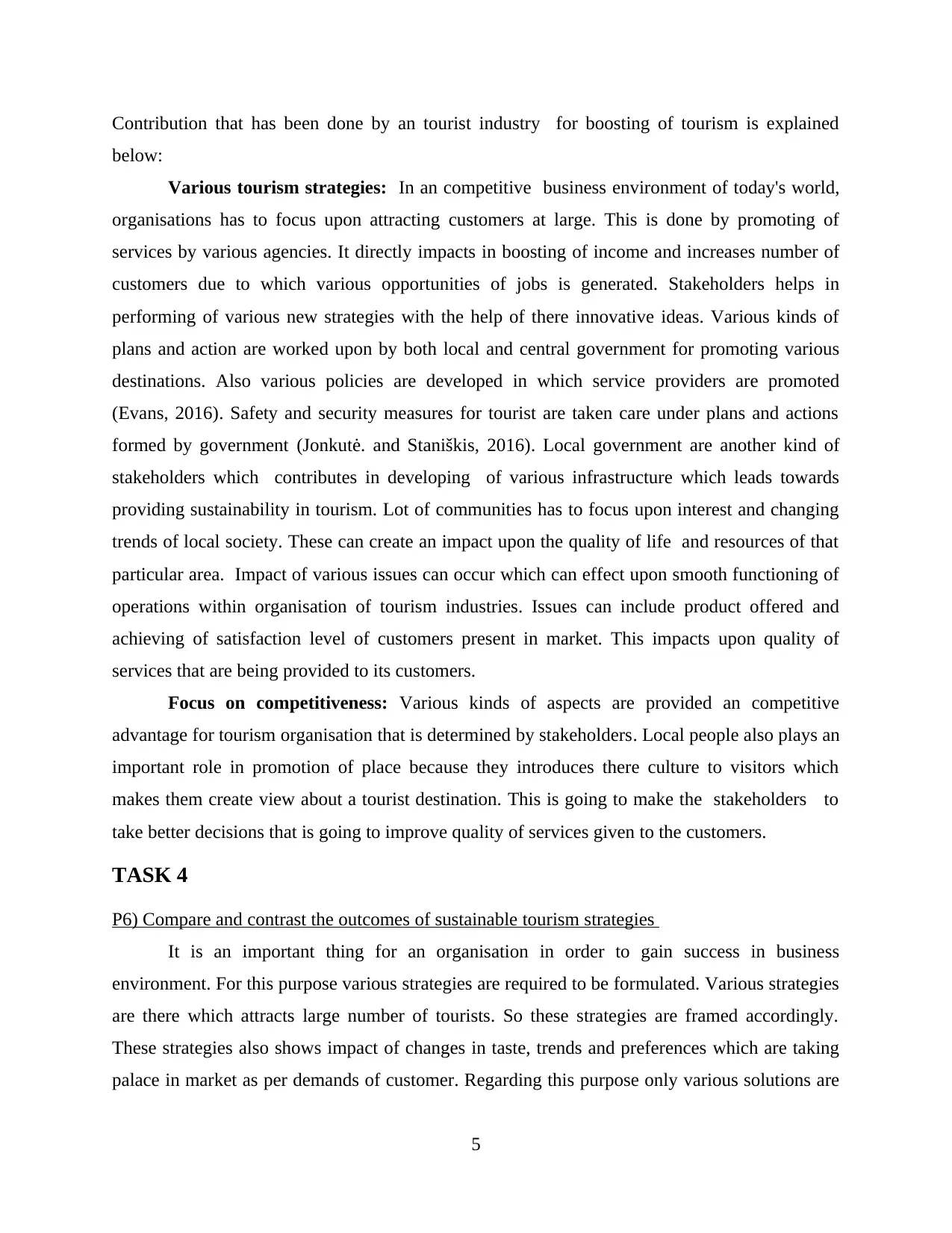
Contribution that has been done by an tourist industry for boosting of tourism is explained
below:
Various tourism strategies: In an competitive business environment of today's world,
organisations has to focus upon attracting customers at large. This is done by promoting of
services by various agencies. It directly impacts in boosting of income and increases number of
customers due to which various opportunities of jobs is generated. Stakeholders helps in
performing of various new strategies with the help of there innovative ideas. Various kinds of
plans and action are worked upon by both local and central government for promoting various
destinations. Also various policies are developed in which service providers are promoted
(Evans, 2016). Safety and security measures for tourist are taken care under plans and actions
formed by government (Jonkutė. and Staniškis, 2016). Local government are another kind of
stakeholders which contributes in developing of various infrastructure which leads towards
providing sustainability in tourism. Lot of communities has to focus upon interest and changing
trends of local society. These can create an impact upon the quality of life and resources of that
particular area. Impact of various issues can occur which can effect upon smooth functioning of
operations within organisation of tourism industries. Issues can include product offered and
achieving of satisfaction level of customers present in market. This impacts upon quality of
services that are being provided to its customers.
Focus on competitiveness: Various kinds of aspects are provided an competitive
advantage for tourism organisation that is determined by stakeholders. Local people also plays an
important role in promotion of place because they introduces there culture to visitors which
makes them create view about a tourist destination. This is going to make the stakeholders to
take better decisions that is going to improve quality of services given to the customers.
TASK 4
P6) Compare and contrast the outcomes of sustainable tourism strategies
It is an important thing for an organisation in order to gain success in business
environment. For this purpose various strategies are required to be formulated. Various strategies
are there which attracts large number of tourists. So these strategies are framed accordingly.
These strategies also shows impact of changes in taste, trends and preferences which are taking
palace in market as per demands of customer. Regarding this purpose only various solutions are
5
below:
Various tourism strategies: In an competitive business environment of today's world,
organisations has to focus upon attracting customers at large. This is done by promoting of
services by various agencies. It directly impacts in boosting of income and increases number of
customers due to which various opportunities of jobs is generated. Stakeholders helps in
performing of various new strategies with the help of there innovative ideas. Various kinds of
plans and action are worked upon by both local and central government for promoting various
destinations. Also various policies are developed in which service providers are promoted
(Evans, 2016). Safety and security measures for tourist are taken care under plans and actions
formed by government (Jonkutė. and Staniškis, 2016). Local government are another kind of
stakeholders which contributes in developing of various infrastructure which leads towards
providing sustainability in tourism. Lot of communities has to focus upon interest and changing
trends of local society. These can create an impact upon the quality of life and resources of that
particular area. Impact of various issues can occur which can effect upon smooth functioning of
operations within organisation of tourism industries. Issues can include product offered and
achieving of satisfaction level of customers present in market. This impacts upon quality of
services that are being provided to its customers.
Focus on competitiveness: Various kinds of aspects are provided an competitive
advantage for tourism organisation that is determined by stakeholders. Local people also plays an
important role in promotion of place because they introduces there culture to visitors which
makes them create view about a tourist destination. This is going to make the stakeholders to
take better decisions that is going to improve quality of services given to the customers.
TASK 4
P6) Compare and contrast the outcomes of sustainable tourism strategies
It is an important thing for an organisation in order to gain success in business
environment. For this purpose various strategies are required to be formulated. Various strategies
are there which attracts large number of tourists. So these strategies are framed accordingly.
These strategies also shows impact of changes in taste, trends and preferences which are taking
palace in market as per demands of customer. Regarding this purpose only various solutions are
5
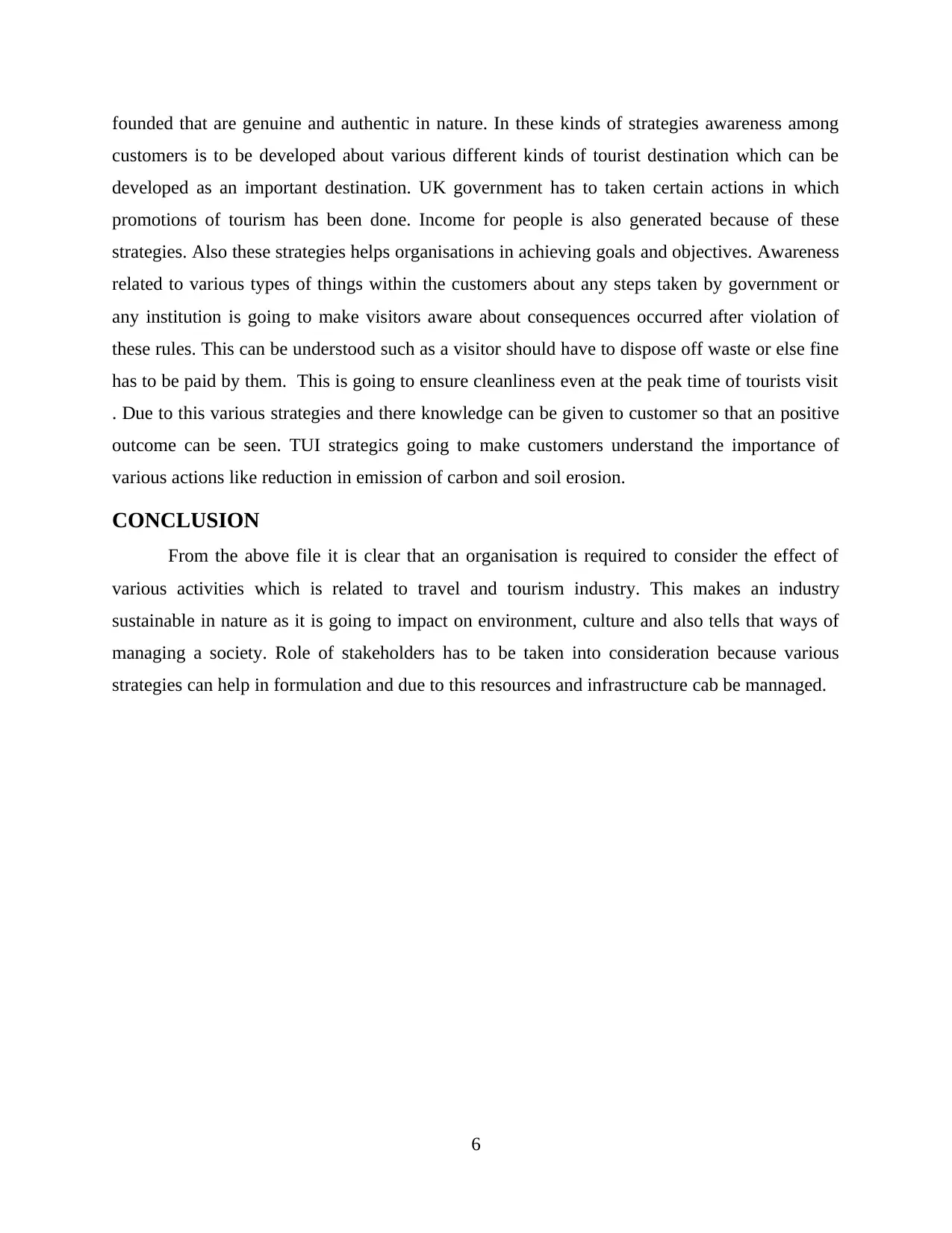
founded that are genuine and authentic in nature. In these kinds of strategies awareness among
customers is to be developed about various different kinds of tourist destination which can be
developed as an important destination. UK government has to taken certain actions in which
promotions of tourism has been done. Income for people is also generated because of these
strategies. Also these strategies helps organisations in achieving goals and objectives. Awareness
related to various types of things within the customers about any steps taken by government or
any institution is going to make visitors aware about consequences occurred after violation of
these rules. This can be understood such as a visitor should have to dispose off waste or else fine
has to be paid by them. This is going to ensure cleanliness even at the peak time of tourists visit
. Due to this various strategies and there knowledge can be given to customer so that an positive
outcome can be seen. TUI strategics going to make customers understand the importance of
various actions like reduction in emission of carbon and soil erosion.
CONCLUSION
From the above file it is clear that an organisation is required to consider the effect of
various activities which is related to travel and tourism industry. This makes an industry
sustainable in nature as it is going to impact on environment, culture and also tells that ways of
managing a society. Role of stakeholders has to be taken into consideration because various
strategies can help in formulation and due to this resources and infrastructure cab be mannaged.
6
customers is to be developed about various different kinds of tourist destination which can be
developed as an important destination. UK government has to taken certain actions in which
promotions of tourism has been done. Income for people is also generated because of these
strategies. Also these strategies helps organisations in achieving goals and objectives. Awareness
related to various types of things within the customers about any steps taken by government or
any institution is going to make visitors aware about consequences occurred after violation of
these rules. This can be understood such as a visitor should have to dispose off waste or else fine
has to be paid by them. This is going to ensure cleanliness even at the peak time of tourists visit
. Due to this various strategies and there knowledge can be given to customer so that an positive
outcome can be seen. TUI strategics going to make customers understand the importance of
various actions like reduction in emission of carbon and soil erosion.
CONCLUSION
From the above file it is clear that an organisation is required to consider the effect of
various activities which is related to travel and tourism industry. This makes an industry
sustainable in nature as it is going to impact on environment, culture and also tells that ways of
managing a society. Role of stakeholders has to be taken into consideration because various
strategies can help in formulation and due to this resources and infrastructure cab be mannaged.
6
⊘ This is a preview!⊘
Do you want full access?
Subscribe today to unlock all pages.

Trusted by 1+ million students worldwide
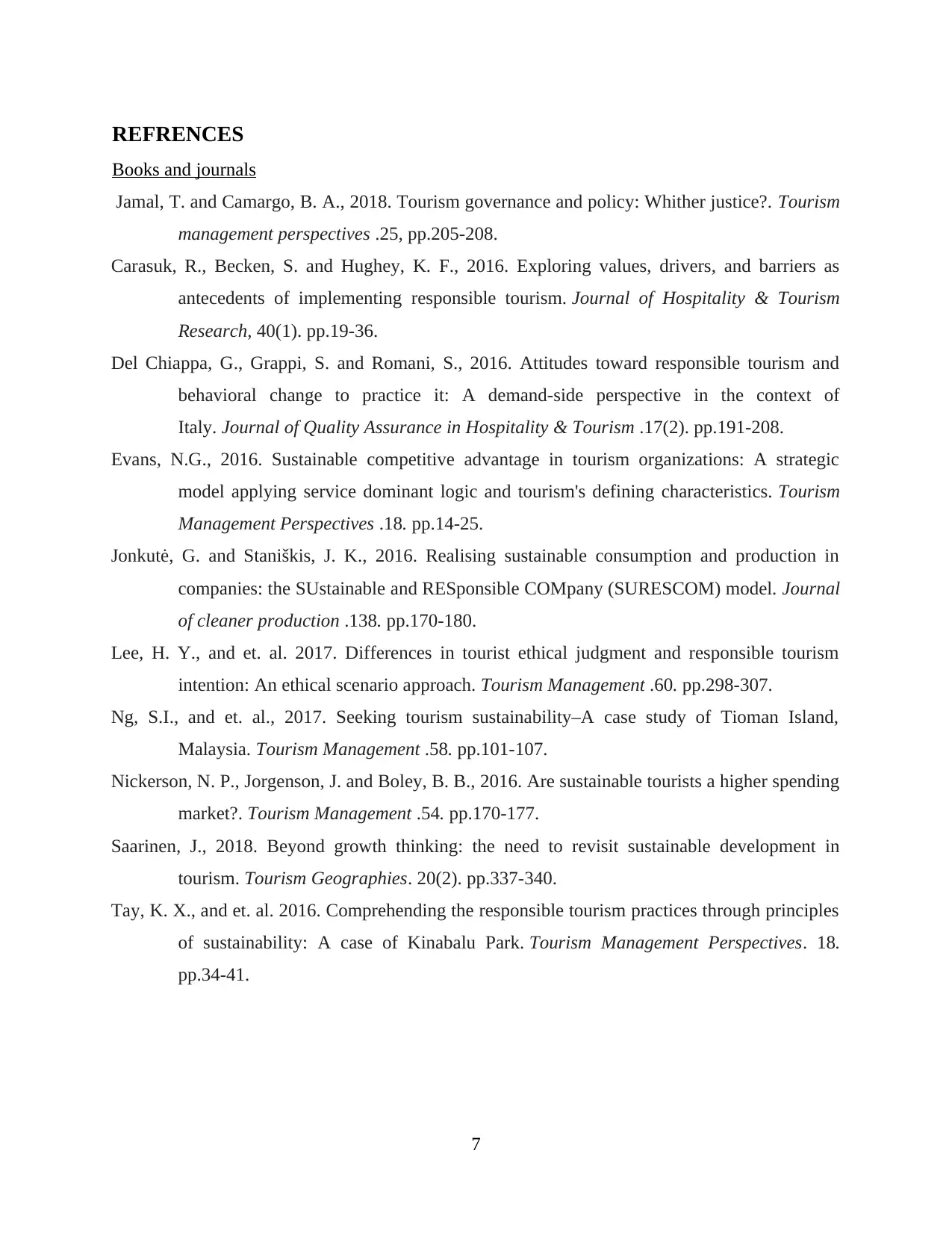
REFRENCES
Books and journals
Jamal, T. and Camargo, B. A., 2018. Tourism governance and policy: Whither justice?. Tourism
management perspectives .25, pp.205-208.
Carasuk, R., Becken, S. and Hughey, K. F., 2016. Exploring values, drivers, and barriers as
antecedents of implementing responsible tourism. Journal of Hospitality & Tourism
Research, 40(1). pp.19-36.
Del Chiappa, G., Grappi, S. and Romani, S., 2016. Attitudes toward responsible tourism and
behavioral change to practice it: A demand-side perspective in the context of
Italy. Journal of Quality Assurance in Hospitality & Tourism .17(2). pp.191-208.
Evans, N.G., 2016. Sustainable competitive advantage in tourism organizations: A strategic
model applying service dominant logic and tourism's defining characteristics. Tourism
Management Perspectives .18. pp.14-25.
Jonkutė, G. and Staniškis, J. K., 2016. Realising sustainable consumption and production in
companies: the SUstainable and RESponsible COMpany (SURESCOM) model. Journal
of cleaner production .138. pp.170-180.
Lee, H. Y., and et. al. 2017. Differences in tourist ethical judgment and responsible tourism
intention: An ethical scenario approach. Tourism Management .60. pp.298-307.
Ng, S.I., and et. al., 2017. Seeking tourism sustainability–A case study of Tioman Island,
Malaysia. Tourism Management .58. pp.101-107.
Nickerson, N. P., Jorgenson, J. and Boley, B. B., 2016. Are sustainable tourists a higher spending
market?. Tourism Management .54. pp.170-177.
Saarinen, J., 2018. Beyond growth thinking: the need to revisit sustainable development in
tourism. Tourism Geographies. 20(2). pp.337-340.
Tay, K. X., and et. al. 2016. Comprehending the responsible tourism practices through principles
of sustainability: A case of Kinabalu Park. Tourism Management Perspectives. 18.
pp.34-41.
7
Books and journals
Jamal, T. and Camargo, B. A., 2018. Tourism governance and policy: Whither justice?. Tourism
management perspectives .25, pp.205-208.
Carasuk, R., Becken, S. and Hughey, K. F., 2016. Exploring values, drivers, and barriers as
antecedents of implementing responsible tourism. Journal of Hospitality & Tourism
Research, 40(1). pp.19-36.
Del Chiappa, G., Grappi, S. and Romani, S., 2016. Attitudes toward responsible tourism and
behavioral change to practice it: A demand-side perspective in the context of
Italy. Journal of Quality Assurance in Hospitality & Tourism .17(2). pp.191-208.
Evans, N.G., 2016. Sustainable competitive advantage in tourism organizations: A strategic
model applying service dominant logic and tourism's defining characteristics. Tourism
Management Perspectives .18. pp.14-25.
Jonkutė, G. and Staniškis, J. K., 2016. Realising sustainable consumption and production in
companies: the SUstainable and RESponsible COMpany (SURESCOM) model. Journal
of cleaner production .138. pp.170-180.
Lee, H. Y., and et. al. 2017. Differences in tourist ethical judgment and responsible tourism
intention: An ethical scenario approach. Tourism Management .60. pp.298-307.
Ng, S.I., and et. al., 2017. Seeking tourism sustainability–A case study of Tioman Island,
Malaysia. Tourism Management .58. pp.101-107.
Nickerson, N. P., Jorgenson, J. and Boley, B. B., 2016. Are sustainable tourists a higher spending
market?. Tourism Management .54. pp.170-177.
Saarinen, J., 2018. Beyond growth thinking: the need to revisit sustainable development in
tourism. Tourism Geographies. 20(2). pp.337-340.
Tay, K. X., and et. al. 2016. Comprehending the responsible tourism practices through principles
of sustainability: A case of Kinabalu Park. Tourism Management Perspectives. 18.
pp.34-41.
7
1 out of 10
Related Documents
Your All-in-One AI-Powered Toolkit for Academic Success.
+13062052269
info@desklib.com
Available 24*7 on WhatsApp / Email
![[object Object]](/_next/static/media/star-bottom.7253800d.svg)
Unlock your academic potential
Copyright © 2020–2025 A2Z Services. All Rights Reserved. Developed and managed by ZUCOL.





